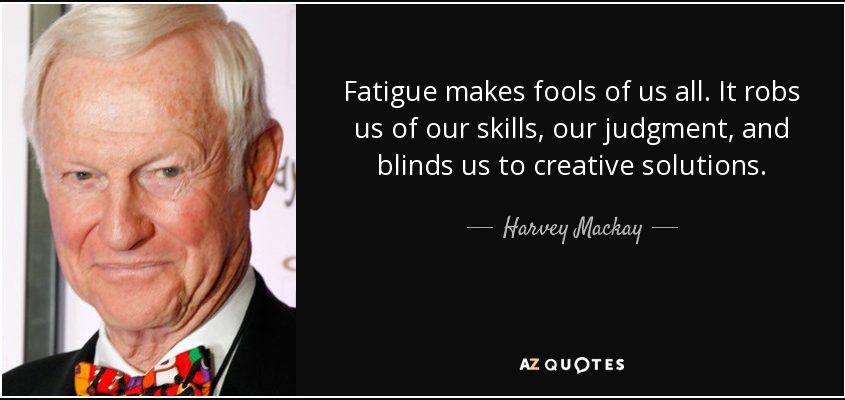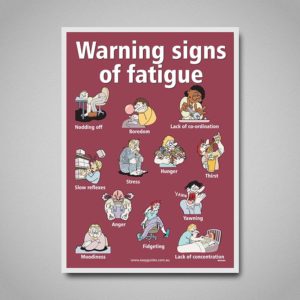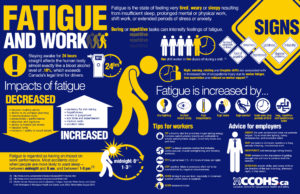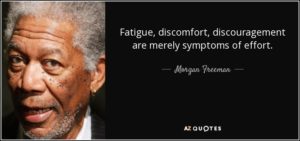
How to deal with the consequences of workplace fatigue and how to combat it?

Workplace fatigue can affect internally as well as externally the growth of the concern. Workplace fatigue is not an employee Issue alone. He lets his workplace fatigue spread to others with tiredness and laziness that had plagued all over him.
What do some of the industrial mishaps have in common? The causes of these accidents often connected to sleep deficit and worker fatigue.
A fatigued worker can adversely impact not just his own health, safety and efficiency, but the safety and efficacy of operation of the organisation as well. Tired individuals are less productive and less focused. They have more medical issues, are absent more often, and are more likely to get involved in a job-related safety incident.
When you think that we can survive longer without food than without sleep, then the seriousness of the problem becomes apparent. If you feel pride in yourself on being able to function on minimal sleep, or your workspace has a culture of burning the candle at both ends, the points given below deserve some consideration.

What are the consequences of minimal sleep?
- Minimal sleep causes accidents
Sleep loss and fatigue have been the factors in a few biggest disasters in recent history, including the nuclear accident happened in 1979 and the nuclear meltdown at Chernobyl happened in 1986. Studies show that poor-quality sleep or insomnia also leads to workplace accidents and injuries. In a study, workers who complained about excessive daytime drowsiness had significantly more work accidents.
- Sleep deprivation muddies the Mind
Sleep plays a critical part in thinking and learning. Sleeplessness affects these cognitive processes in many ways.
First, it impairs attention, alertness, concentration, and problem-solving. Battling with the continuous fog fuelled by sleep loss makes it difficult to learn efficiently.
Second, during night time, various sleep cycles serve to implant memories in mind. If you don’t get sufficient sleep, you won’t be able to remember what you learned and experienced during the day. A problem can affect even the most competent employee’s productivity.
- Sleep loss can lead to serious health issues
Sleep dysfunctions and chronic sleep deprivation can put you at risk for severe health issues such as heart attack and high blood pressure. Our bodies need rest to recover and regenerate.
- Lack of sleep makes you forget things
Sometimes you may find yourself bungling for the right words in an important meeting or staring blankly at a client or customer trying desperately to remember their name. It also happens because of not getting enough sleep.
- Sleeping fewer increases your risk of death!
The final and most dramatic point is that sleep deprivation could increase an individual’s risk of death. Sleep deprivation affects the mortality and those who had cut their sleep from seven to five hours or less a night nearly double their risk of death.
How to combat fatigue in the workplace
If your workspace resembles a scene from the walking dead, fret not. You can see the sunlight again at the end of the tunnel. The good news is that managing workplace fatigue can be relatively easy. You can initiate inexpensive wellness to help alleviate this problem among your employees. Consider the following points when looking to combat employees fatigue.
- Educate your employees
By offering employee educational materials, you can address the general problems of fatigue. Through this, they will get to know why getting sufficient sleep is so crucial and the tips for getting better sleep. You can also investigate sleep-tracker websites, apps or tools that will let your employees record the amount their nightly sleep and corresponding mood. Employees may get surprised at the actual amount of quality sleep they are getting each night.
- Cultivate healthy habits
Cultivating positive habits can contribute to a better night’s sleep. Encourage employees to eat nutritiously, exercise daily, and limit their consumption of tobacco, caffeine, and alcohol. Late-night consumption of caffeine and being glued to electronic devices just before bedtime can influence both the quality and quantity of sleep.
- Change the environment
General workplace changes can also effectively cause fatigue and its accompanying risks. So, install proper lighting everywhere, designate quiet break areas and offer healthy food options in break rooms. Consider adjusting policies to provide more frequent and restful breaks. Use machinery and equipment that eliminates or diminishes any excessive physical demands of your employees. It can include ergonomic furniture and anti-fatigue matting.
- Ask the Individual
Ask employees what time of the day they get most tired, and think of measures to approach those times, e.g. offering a short extra break, providing a healthy snack option or allowing them to listen to music. It is especially important for employees who work in safety-sensitive jobs, where fatigue is a major hazard.
- Re-examine Job Descriptions
Take a glimpse at your individual job descriptions and workloads as well to see if there may be a reason why a particular person or department may be struggling with fatigue. You may notice that a job description is unbalanced or has had responsibilities added to it over the years. Then, consider redesigning the job to include a variety of mental and physical tasks instead of all physical or all mental.
Taking even small actions is an essential first step in addressing fatigue in your workplace.





